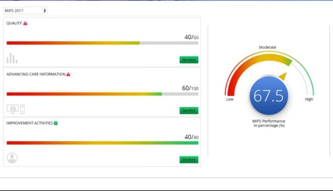Session Information
Date: Sunday, November 5, 2017
Title: Plenary Session I
Session Type: ACR Plenary Session
Session Time: 11:00AM-12:30PM
Background/Purpose: Under the new Medicare Access and CHIP Reauthorization Act (MACRA), the quality of care rheumatologists provide will have financial repercussions through the Merit Based Incentive Program (MIPS). MIPS will score providers across four domains: Quality, Clinical Practice Improvement, Advancing Care Information and Cost. In this study, we sought to evaluate performance on quality measures for practices participating in the Rheumatology Informatics System for Effectiveness (RISE) registry in the first quarter of 2017 and to develop a prototype dashboard for RISE to assist clinicians in understanding their MIPS performance.
Methods: The RISE informatics platform continuously collects data from the electronic health records (EHRs) of participating practices, allowing centralized aggregation and analysis of quality measures. Measures in the areas of rheumatoid arthritis, drug safety, preventive care and gout were examined. For the first quarter of 2017 (the initial period eligible for MIPS reporting), we calculated performance on quality measures, defined as the percentage of eligible patients receiving recommended care. We also developed a prototype dashboard for RISE that will display scores across the four MIPS domains to help clinicians track their performance over time.
Results: Data from 548,990 patients across 491 clinicians and 109 practices was examined. Most rheumatologists were in a group practice (72%); 26% were in solo practice and 2% part of a larger health system. Mean (SD) patient age was 59 (16) years, 75% were female, 21% were racial/ethnic minorities. Performance on measures varied significantly across practices (Table). For 2 of 5 measures for which the Medicare program has set national benchmarks, average performance of RISE practices exceeded targets in the first quarter of 2017. Quality measures that make up the MIPS quality domain were combined with simulated information for other MIPS domains to develop a MIPS dashboard prototype for RISE, displayed in the Figure.
Conclusion: We found significant variation in performance on quality measures in the first quarter of 2017 across RISE practices, with some practices having already achieved a very high level of performance. We anticipate that the MIPS dashboard prototype will go-live on the RISE user interface in late 2017 and will aid rheumatologists in proactively monitoring their MIPS score.
Table. Performance on Quality Measures in the RISE Registry in 2017.
|
Electronic Quality Measure (eCQM) |
Measure denominator (N) |
Average performance across patients (%) |
Pratice-level performance (percentile) |
CMS benchmark |
|
|
50th |
100th |
||||
|
Rheumatoid arthritis: Assessment of Disease Activity Functional Status Assessment DMARD |
95,662 95,662 95,662 |
46.2 45.6 91.0 |
43.6 42.6 93.9 |
83.8 85.9 95.7 |
|
|
Drug Safety TB screening pre-biologic 1+ High-Risk Medication in Elderly* 2+ High-Risk Medications in Elderly* |
9,684 159,370 159,370 |
57.9 5.7 0.1 |
65.9 2.8 0 |
78.6 0 0 |
9.0 9.0 |
|
Preventive Care Tobacco screening and counseling BMI documentation, follow-up plan Blood pressure management |
280,725 231,846 58,594 |
77.9 41.7 62.9 |
87.4 34.3 62.4 |
92.3 59.0 74.8 |
89.7 57.8 68.5 |
|
Gout Serum urate monitoring Serum urate target <6.8 mg/dL Serum urate lowering therapy |
2,487 3,251 1,098 |
32.1 30.0 64.2 |
36.4 26.5 80 |
47.1 47.5 95.7 |
|
|
*Lower number indicates higher performance |
|||||
Figure. Prototype Merit Based Incentive Payment System (MIPS) Dashboard for the RISE registry.
To cite this abstract in AMA style:
Yazdany J, Johansson T, Myslinski R, Kazi S. Performance on Quality Measures in the RISE Registry and the Merit-Based Incentive Payment System (MIPS) [abstract]. Arthritis Rheumatol. 2017; 69 (suppl 10). https://acrabstracts.org/abstract/performance-on-quality-measures-in-the-rise-registry-and-the-merit-based-incentive-payment-system-mips/. Accessed .« Back to 2017 ACR/ARHP Annual Meeting
ACR Meeting Abstracts - https://acrabstracts.org/abstract/performance-on-quality-measures-in-the-rise-registry-and-the-merit-based-incentive-payment-system-mips/

